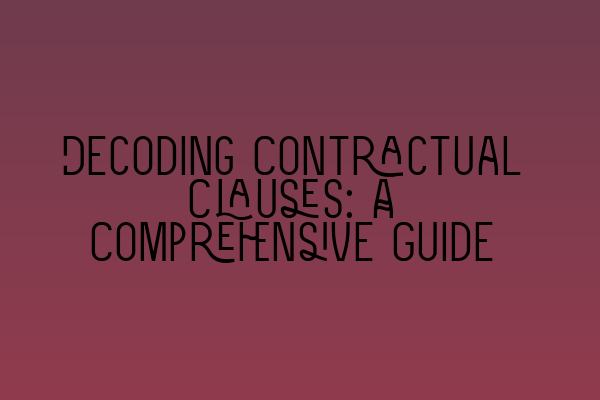Decoding Contractual Clauses: A Comprehensive Guide
When it comes to contract law, understanding the language and meaning behind contractual clauses is crucial. These clauses are the building blocks of any legally binding agreement, and their interpretation can have significant implications. In this comprehensive guide, we will break down the complexities of contractual clauses and provide you with the knowledge to navigate them effectively.
1. Introduction to Contractual Clauses
A contractual clause is a provision or a series of provisions within a contract that sets out the rights, obligations, and responsibilities of the parties involved. These clauses define the scope of the agreement, govern its performance, and mitigate potential risks and uncertainties.
There are various types of contractual clauses, each serving a specific purpose. Some common clauses include:
- Agreements in Contract Law: Understanding Its Various Types
- Conditions precedent
- Warranties and representations
- Indemnity and limitation of liability
- Termination and force majeure
- Dispute resolution
Understanding the intent behind each clause is vital to ensure compliance and minimize disputes in the future. Let’s dive deeper into some key contractual clauses and their significance.
2. Conditions Precedent and Subsequent
Conditions precedent and subsequent are clauses that outline certain requirements or events that need to occur before or after a contract can be executed or terminated. These clauses play a crucial role in determining the timing and validity of a contract.
For example, a sales contract may include a condition precedent that states the buyer must secure financing before the sale can proceed. If the buyer fails to meet this condition, the contract may be rendered void, and the seller can seek alternative avenues.
To learn more about the role of conditions precedent and subsequent in contracts, check out this insightful article on the impact of frustration on contractual obligations.
3. Warranties and Representations
Warranties and representations are statements of fact made by one party to another, guaranteeing the truthfulness and accuracy of certain information. These clauses help establish transparency and trust between the contracting parties.
For instance, in a business acquisition agreement, the seller may provide warranties and representations regarding the financial health of the company, its assets, and any ongoing legal disputes. If any of these warranties turn out to be false, the buyer may have grounds for legal action.
Discover the intricacies of interpreting contractual clauses and unlocking hidden meanings in this informative article on interpreting contractual clauses.
4. Indemnity and Limitation of Liability
Indemnity and limitation of liability clauses protect parties from potential losses and define the extent of liability in the event of a breach or dispute. These clauses allocate risks and establish the financial consequences of non-compliance.
For example, a construction contract may include an indemnity clause that holds the contractor responsible for any damages caused to third parties during the course of the project. This protects the property owner from potential legal and financial liabilities.
5. Termination and Force Majeure
Termination and force majeure clauses outline the circumstances under which a contract can be terminated or suspended due to unforeseen events that are beyond the control of the parties involved. These clauses provide parties with protection in case of unexpected disruptions.
Common force majeure events include natural disasters, wars, strikes, and government regulations. When such an event occurs, the affected party may be excused from performing its contractual obligations for the duration of the force majeure event.
6. Dispute Resolution
Dispute resolution clauses set out the procedures to be followed in case of a dispute between the parties. These clauses define the forum and the method of resolving disputes, whether it be litigation, arbitration, or mediation.
Properly drafted dispute resolution clauses can save parties time, money, and potential reputational damage. It is vital to carefully consider these clauses and ensure they align with the overall objectives and preferences of all parties involved.
To gain further insights into the legal aspects of business contracts and key considerations for entrepreneurs, refer to this informative article on the topic.
Conclusion
Contractual clauses are the backbone of any legally binding agreement. Understanding their purpose, interpretation, and implications is essential for all parties involved. By decoding contractual clauses, you can navigate contracts with confidence, minimize risks, and ensure compliance.
Remember, contract law can be complex, and seeking professional legal advice is always recommended to ensure your rights and interests are protected.
For more information on SQE Contract Law and a comparative analysis with traditional qualifications, check out this article to make an informed decision about your legal education and career.
